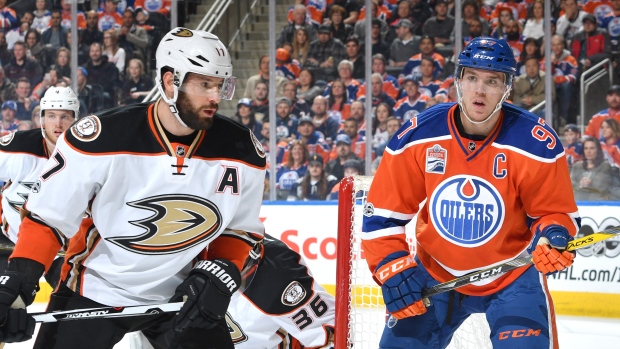Apr 24, 2017
How will the Ducks defend McDavid?
Travis Yost examines Anaheim’s options for trying to slow the superstar centre ahead of their second-round series against the Edmonton Oilers.
By Travis Yost

How do you slow down Connor McDavid?
That’s the question the Anaheim Ducks face after the Oilers took care of the San Jose Sharks in the first round. I’m not sure whether or not Anaheim is happy about that development, but I do know that either opponent would’ve posed unique challenges.
For Edmonton, it’s pretty simple: Everything runs through their superstar centre. McDavid already is in the discussion as the world’s best hockey player, and he just turned 20 in January. He possesses all-world speed, has underrated strength on the puck, and has the type of hands that can set up shooters in the offensive zone from any and every angle.
Anaheim – by way of having home ice in the series – will get to largely control the matchups, and their first point of emphasis is going to be McDavid.
Anaheim’s one of the few teams left in the league that has a checking line in the trio of Ryan Kesler, Andrew Cogliano, and Jakob Silfverberg. Head coach Randy Carlyle has thrown that group head-to-head with every team’s best forwards all year long, and they’ve had reasonable success.
In the 830 minutes this group played together (data via Corsica), they controlled about 54 per cent of the shots, 58 per cent of the scoring chances and 57 per cent of the goals. Those are strong number for a line that started a high percentage of its shifts in the defensive zone and took on the other team’s best on a nightly basis.
Carlyle was no different in his deployment of this group in the handful of games against the Oilers this year. In those five games, the group averaged nearly 10 minutes a night against the McDavid group (primarily wingers Leon Draisaitl and Patrick Maroon, with a bit of Jordan Eberle), with the Ryan Getzlaf line picking up slack where he could:

In those 50 minutes, the Anaheim checking line had about 46 per cent of the shots and scoring chances against the McDavid group. Not exactly sterling numbers, but I’m not sure where you draw the line for success against a player of his calibre. What it does do is put a lot of pressure on guys like Getzlaf, Corey Perry, Rickard Rakell and Patrick Eaves to dominate the rest of the Oilers lineup.
Defensively, the matchup is more interesting. Either Carlyle was still trying to figure out which pair matched up best against McDavid during the regular season, or he simply thinks the majority of his defenders are reasonably suited for the duty. Their deployment against the McDavid line has been much more flat, and much less predictable:

A guy like Hampus Lindholm makes the most sense as a matchup for McDavid, mostly because he’s an incredible puck-mover and the type of guy your five-man unit needs to push Edmonton into their defensive zone. Forcing a player like McDavid to defend for the majority of his shift remains the best solution, but that’s always going to be easier said than done.
But, like I said, the ice-time is much more evenly distributed here, and Anaheim’s injury situation is still pretty murky. Josh Manson, as one example, fits perfectly as Lindholm’s partner – and I’d comfortably argue that such a duo, along with Anaheim’s checking line, has the best chance to slow down McDavid.
However, Carlyle has been forced to split the two up due to injuries to Cam Fowler and Sami Vatanen, which means Manson anchoring his own pairing with the lesser-used Korbinian Holzer. (That’s also meant call-up Brandon Montour playing minutes with Hampus Lindholm.)
Manson, like Kevin Bieksa, plays more of a rugged game. He can work McDavid along the boards and try to take a physical, defence-first approach, but neither is the fleetest of foot. McDavid is notorious for burning defencemen of all skating abilities, and getting big minutes against a Manson or Bieksa without requisite help elsewhere could mean a lot of great looks on John Gibson.
Fowler and Vatanen still aren’t skating, which means Carlyle has to answer one immediate question: Do you reunite Lindholm and Manson for a hard-matching against McDavid in games one and two, or do you spread your talent out and try to win in the minutes McDavid is off of the ice?
There is no good answer to this question, which is why I believe Edmonton’s a bigger playoff threat than a lot of others are giving them credit for. When you have the best player in a series, and that player is playing a lot of minutes, you need an awful lot to break right elsewhere.
And make no mistake, McDavid is the best player in this series.

